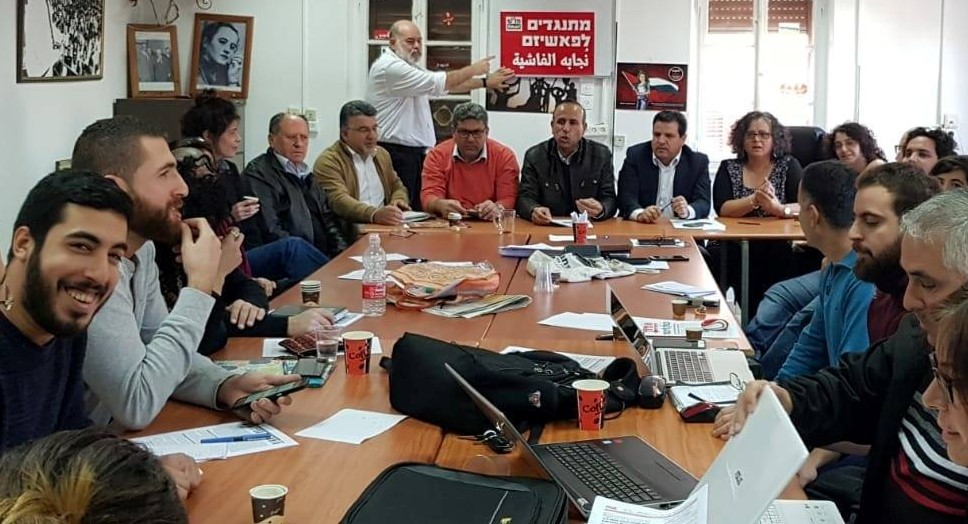Last weekend, Hadash (the Democratic Front for Peace and Equality, the electoral front headed by the Communist Party of Israel) launched its campaign for the upcoming April 9th general elections for the 21st Knesset. Preparatory meetings were held last week in Tel Aviv, Jerusalem, Haifa and Nazareth.

Hadash electoral committee meeting last weekend to launch the party’s campaign for the upcoming general elections for the 21st Knesset; the red placard held up in the background reads “Opposing Fascism.” (Photo: Zo Hederech)
Hadash is part of the Joint List parliamentary alliance that also includes Balad, Ta’al and Ra’am (United Arab List) and which was formed before the previous national elections of 2015 after the government coalition passed legislation in the Knesset to raise the electoral threshold to 3.25 percent. This undemocratic move was designed to prevent smaller parties (in particular those representing Arab citizens of Israel) from winning seats in the parliament. Hadash and the three Arab parties cited above countered this step my forming the Joint List alliance that subsequently won 13 seats in the 2015 elections, making it the third-largest political bloc in the 20th Knesset following far-right Prime Minister Binyamin Netanyahu’s ruling Likud (30 seats) and the Zionist Union (24 seats), the latter of which recently broke apart into its component elements, Labor led by Avi Gabbay and Hatnua headed up by Tzipi Livni.
Last week MK Ahmad Tibi withdrew his one-MK Ta’al party (Arab Movement for Change) from the Joint List ahead of the April 9 elections, purportedly to run independently, even though it is unclear whether Tibi’s party will be able to pass the electoral threshold running on its own.
In the meetings held by Hadash representative this past week, with regard to Tibi’s decision, Hadash MK Youssef Jabareen stressed his “hope that it’s not the final word and I continue to believe that all parties in the Joint List can still find a way to keep the bloc together: Our strength is in out unity.” “Our major achievements have been in the socioeconomic realms, education and development, and we anticipate continuing to promote these areas,” Jabareen said. “It was almost impossible for us to influence political issues [in the latest parliament] with the right-wing governing coalition, but through persistent pressure we were able to guarantee the allocation of more budgets for Arab localities.”
By most accounts, the most significant measure passed under the auspices of the Joint List was the “Economic Development Plan for the Arab Sector,” which will pump about 4 billion shekels into Arab communities over the next five years, in the largest-ever effort to close the economic gap between the Arab and Jewish publics.
Related: MK Tibi’s Party Leaves Joint List; MK Odeh — “Our Unity Is Vital”


